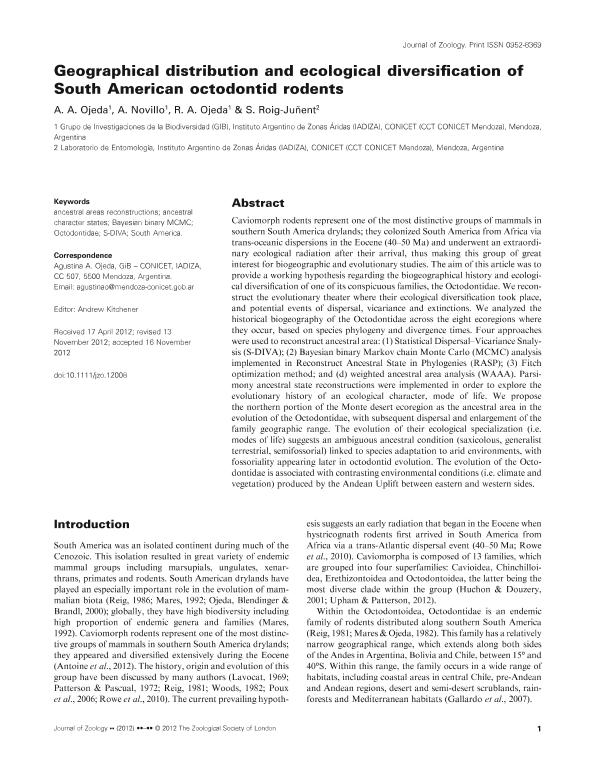Artículo
Geographical distribution and ecological diversification of South American octodontid rodents
Ojeda, Agustina Alejandra ; Novillo, Agustina
; Novillo, Agustina ; Ojeda, Ricardo Alberto
; Ojeda, Ricardo Alberto ; Roig Junent, Fidel Alejandro
; Roig Junent, Fidel Alejandro
 ; Novillo, Agustina
; Novillo, Agustina ; Ojeda, Ricardo Alberto
; Ojeda, Ricardo Alberto ; Roig Junent, Fidel Alejandro
; Roig Junent, Fidel Alejandro
Fecha de publicación:
02/2013
Editorial:
Wiley Blackwell Publishing, Inc
Revista:
Journal Of Zoology
ISSN:
0952-8369
Idioma:
Inglés
Tipo de recurso:
Artículo publicado
Clasificación temática:
Resumen
Caviomorph rodents represent one of the most distinctive groups of mammals in southern South America drylands; they colonized South America from Africa via trans-oceanic dispersions in the Eocene (40-50 Ma) and underwent an extraordinary ecological radiation after their arrival, thus making this group of great interest for biogeographic and evolutionary studies. The aim of this article was to provide a working hypothesis regarding the biogeographical history and ecological diversification of one of its conspicuous families, the Octodontidae. We reconstruct the evolutionary theater where their ecological diversification took place, and potential events of dispersal, vicariance and extinctions. We analyzed the historical biogeography of the Octodontidae across the eight ecoregions where they occur, based on species phylogeny and divergence times. Four approaches were used to reconstruct ancestral area: (1) Statistical Dispersal-Vicariance Snalysis (S-DIVA); (2) Bayesian binary Markov chain Monte Carlo (MCMC) analysis implemented in Reconstruct Ancestral State in Phylogenies (RASP); (3) Fitch optimization method; and (d) weighted ancestral area analysis (WAAA). Parsimony ancestral state reconstructions were implemented in order to explore the evolutionary history of an ecological character, mode of life. We propose the northern portion of the Monte desert ecoregion as the ancestral area in the evolution of the Octodontidae, with subsequent dispersal and enlargement of the family geographic range. The evolution of their ecological specialization (i.e. modes of life) suggests an ambiguous ancestral condition (saxicolous, generalist terrestrial, semifossorial) linked to species adaptation to arid environments, with fossoriality appearing later in octodontid evolution. The evolution of the Octodontidae is associated with contrasting environmental conditions (i.e. climate and vegetation) produced by the Andean Uplift between eastern and western sides.
Archivos asociados
Licencia
Identificadores
Colecciones
Articulos(CCT - MENDOZA)
Articulos de CTRO.CIENTIFICO TECNOL.CONICET - MENDOZA
Articulos de CTRO.CIENTIFICO TECNOL.CONICET - MENDOZA
Articulos(IADIZA)
Articulos de INST. ARG DE INVEST. DE LAS ZONAS ARIDAS
Articulos de INST. ARG DE INVEST. DE LAS ZONAS ARIDAS
Citación
Ojeda, Agustina Alejandra; Novillo, Agustina; Ojeda, Ricardo Alberto; Roig Junent, Fidel Alejandro; Geographical distribution and ecological diversification of South American octodontid rodents; Wiley Blackwell Publishing, Inc; Journal Of Zoology; 2-2013; 285-293
Compartir
Altmétricas



